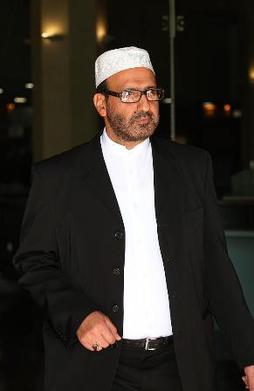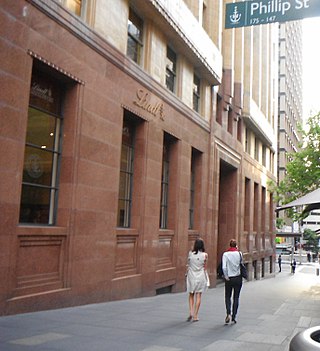Related Research Articles
The Australian Security Intelligence Organisation is Australia's national security agency responsible for the protection of the country and its citizens from espionage, sabotage, acts of foreign interference, politically motivated violence, attacks on the Australian defence system, and terrorism. ASIO is part of the Australian Intelligence Community and is comparable to the American FBI and the British MI5.
Three anti-terrorism bills were enacted in the Australian Parliament in 2004 by the Howard Coalition government with the support of the Labor Opposition. These were the Anti-terrorism Bill 2004, the Anti-terrorism Bill 2004 and the Anti-terrorism Bill 2004.

Mamdouh Habib is an Egyptian and Australian citizen with dual nationality, best known for having been held for more than three years by the United States as an enemy combatant, by both the Central Intelligence Agency (CIA) and military authorities. He was sent by extraordinary rendition from Pakistan to Egypt after his arrest. He was held the longest at the Guantanamo Bay detention camp as an enemy combatant. Finally released without charges in January 2005, Habib struggled to have his account of his experiences believed, as he alleged he had been tortured by the CIA, Egyptians, and US military, at times with Australian intelligence officers present. For some time, each of the governments denied his allegations, but they have gradually been confirmed.

Islam in Australia is a minority religious affiliation. According to the 2021 Census in Australia, the combined number of people who self-identified as Muslims in Australia, from all forms of Islam, constituted 813,392 people, or 3.2% of the total Australian population. That total Muslim population makes Islam, in all its denominations and sects, the second largest religious grouping in Australia, after all denominations of Christianity.

The Anti-Terrorism Act 2005 (Cth) is an Act of the Parliament of Australia, which is intended to hamper the activities of any potential terrorists in the country. The counter-terrorism law was passed on 6 December 2005.
Abdul Nacer Benbrika, also known as Abu Bakr, is a convicted criminal, currently serving an Australian custodial sentence of fifteen years, with a non-parole period of twelve years for intentionally being the leader and a member of a terrorist organisation. Benbrika was one of 17 men arrested in the Australian cities of Sydney and Melbourne in November 2005, charged with being members of a terrorist organisation and of planning terrorist attacks on targets within Australia. Benbrika is alleged to be the spiritual leader of the group. All 17 men pleaded not guilty. On 15 September 2008 Benbrika was found guilty as charged and subsequently sentenced.
Faheem Khalid Lodhi is a convicted Pakistani–Australian criminal and architect, currently serving an Australian custodial sentence of twenty years, with a non-parole period of fifteen years for conspiring to commit a terrorist act or acts. Lodhi was the first convicted Australian terrorist under amendments made to the Commonwealth's Criminal Code Act 1995, in May 2003.

Waleed Aly is an Australian television presenter, journalist, academic, and lawyer.
Terrorism in Australia deals with terrorist acts in Australia as well as steps taken by the Australian government to counter the threat of terrorism. In 2004 the Australian government has identified transnational terrorism as also a threat to Australia and to Australian citizens overseas. Australia has experienced acts of modern terrorism since the 1960s, while the federal parliament, since the 1970s, has enacted legislation seeking to target terrorism.

Stop the War Coalition (StWC) is an Australian anti-war group initially formed in Sydney in 2003 in response to the US-led wars in Iraq and Afghanistan and the general "War on Terror" of which the Australian Government has been a strong ally.

Man Haron Monis was an Iranian-born refugee and Australian citizen who took hostages in a siege at the Lindt Chocolate Café at Martin Place, Sydney on 15 December 2014, lasting for 17 hours, until the early hours of the following morning. The siege resulted in the death of Monis and two hostages.
Australian Marriage Equality (AME) was an advocacy group driven by volunteers who came together to pursue the legalisation of same-sex marriage in Australia. AME partnered with a diverse range of organisations and supporters across the country to end the exclusion of same-sex LGBTIQ couples from marriage in Australia. It was the pre-eminent group campaigning for same-sex marriage in Australia.
Zaky Mallah is an Australian who pleaded guilty to threatening to kill officers of ASIO or DFAT. In 2011 Mallah travelled to Syria to film the Syrian Civil War, declaring himself in support of the Free Syrian Army. In 2015 he was controversially allowed to ask a question on the ABC program Q&A, leading then Prime Minister of Australia Tony Abbott to question "Which side is the ABC on"?
Mass surveillance in Australia takes place in several network media, including telephone, internet, and other communications networks, financial systems, vehicle and transit networks, international travel, utilities, and government schemes and services including those asking citizens to report on themselves or other citizens.
Islamic organisations in Australia include a wide range of groups and associations run and supported by the Islamic community in Australia. Organisations include major community councils, local organisations, mosques and schools. Most Australian Muslims are Sunni, with Shia then Sufi and Ahmadiyya as minorities.

The Lindt Café siege was a terrorist attack that occurred on 15–16 December 2014 when a lone gunman, Man Haron Monis, held hostage ten customers and eight employees of a Lindt Chocolate Café in the APA Building in Martin Place, Sydney, Australia.
Islamophobia in Australia is highly speculative and affective distrust and hostility towards Muslims, Islam, and those perceived as following the religion. This social aversion and bias is often facilitated and perpetuated in the media through the stereotyping of Muslims as violent and uncivilised. Various Australian politicians and political commentators have capitalised on these negative stereotypes and this has contributed to the marginalisation, discrimination and exclusion of the Muslim community.

The Telecommunications (Interception and Access) Amendment (Data Retention) Act 2015(Cth) is an Act of the Parliament of Australia that amends the Telecommunications (Interception and Access) Act 1979 (original Act) and the Telecommunications Act 1997 to introduce a statutory obligation for Australian telecommunication service providers (TSPs) to retain, for a period of two years, particular types of telecommunications data (metadata) and introduces certain reforms to the regimes applying to the access of stored communications and telecommunications data under the original Act.
Far-right politics in Australia describes authoritarian ideologies, including fascism and White supremacy as they manifest in Australia.
Far-right terrorism in Australia has been seen as an increasing threat since the late 2010s, with a number of far-right extremist individuals and groups, including neo-Nazis and other hate groups, becoming known to authorities, in particular the Australian Security Intelligence Organisation (ASIO) and the Australian Federal Police (AFP). In early 2021 the first far-right extremist group was added to the list of proscribed terrorist groups, this group being the Sonnenkrieg Division.
References
- ↑ In laws we trust ... don't we? The Age, 11 September 2004. Retrieved 12 May 2007
- ↑ AMCRAN About Us Official website. Retrieved 12 May 2007
- ↑ NSWCCL media release: 6/2004 Archived 30 August 2007 at the Wayback Machine
- ↑ Terrorism Laws: ASIO, the Police and You Archived 9 June 2007 at the Wayback Machine First Edition, AMCRAN July 2004. Retrieved 12 May 2007
- ↑ Guide to law on terrorism by Stephen Gibbs, The Sydney Morning Herald, 26 July 2004. Retrieved 12 May 2007
- ↑ Guide to terrorism laws aimed at all Australians ABC Radio transcript, The World Today, 26 July 2004. Retrieved 12 May 2007
- ↑ Muslims object to new powers by Lee Glendinning, The Age, 26 September 2005. Retrieved 12 May 2007
- ↑ Fear that law changes will curb free speech by Tom Allard, The Sydney Morning Herald, 9 September 2005. Retrieved 12 May 2007
- ↑ Dob in the fanatics, pleads PM by Phillip Hudson, Jason Dowling and Michelle Grattan, The Age. 13 November 2005. Retrieved 12 May 2007
- ↑ Submissions: State and Territory preventative detention powers AMCRAN 6 February 2006. Retrieved 12 May 2007
- ↑ Submissions to Inquiry into the Defence Legislation Amendment (Aid to Civilian Authorities) Bill 2005 Archived 11 June 2007 at the Wayback Machine Parliament of Australia, Senate
- ↑ ADF role in terror response criticised The Sydney Morning Herald, 19 January 2006. Retrieved 12 May 2007